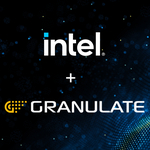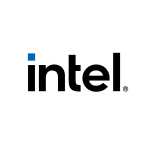Intel to Acquire Granulate

Granulate’s autonomous optimization software helps drive greater performance and ROI in the cloud and data center.
SANTA CLARA, Calif.–(BUSINESS WIRE)–Intel Corporation today announced an agreement to acquire Granulate Cloud Solutions Ltd., an Israel-based developer of real-time continuous optimization software. The acquisition of Granulate will help cloud and data center customers maximize compute workload performance and reduce infrastructure and cloud costs. Deal terms are not being disclosed.
“Today’s cloud and data center customers demand scalable, high-performance software to make the most of their hardware deployments,” said Sandra Rivera, executive vice president and general manager of the Datacenter and AI Group at Intel. “Granulate’s cutting-edge autonomous optimization software can be applied to production workloads without requiring the customer to make changes to its code, driving optimized hardware and software value for every cloud and data center customer.”
Greg Lavender, chief technology officer, senior vice president and general manager of the Software and Advanced Technology Group at Intel, said: “We are building our portfolio of software optimization tools that offer flexible and scalable capabilities that allow us to meet the growing demand of the ubiquitous compute era. Granulate’s innovative approach to real-time optimization software complements Intel’s existing capabilities by helping customers realize performance gains, cloud cost reductions and continual workload learning.”
While cloud computing and microservices have created a new era of flexibility in distributed applications and deployment scalability, modern architectures have introduced more complex performance issues that are not easily managed by traditional operating systems and runtimes. Additionally, customers often deploy older Linux distributions and application libraries that are not up to date with the latest advancements in today’s high-performance CPUs. Intel is committed to helping its customers ensure they are right-sizing their compute clusters, instance types and cloud deployments.
Granulate’s autonomous optimization service solves these issues by reducing CPU utilization and application latencies. It does this by learning the customer’s application and deploying a customized set of continuous optimizations at runtime. This enables deployment on smaller compute clusters and instance types to improve application performance and drive down cloud and data center costs. Granulate’s service does not require developer intervention nor does it require the customer to make changes to its own code. Optimizations for the latest CPUs can be applied even on legacy Linux distributions and runtimes.
Granulate’s autonomous optimization service enables cloud and data center customers to significantly improve the performance of their deployments, reduce operational overhead and lower application costs.
“Together with Intel, we believe we can help customers achieve meaningful cost reductions and five times the throughput across workloads,” said Asaf Ezra, co-founder and CEO of Granulate. “As a part of Intel, Granulate will be able to deliver autonomous optimization capabilities to even more customers globally and rapidly expand its offering with the help of Intel’s 19,000 software engineers.”
Intel and Granulate’s relationship began in late 2019, when Granulate was part of the first graduating class of Intel® Ignite, the startup accelerator program that taps into Intel’s resources to help early-stage companies succeed. Over the past year, Intel and Granulate have worked together under a commercial agreement to collaborate on workload optimization on Xeon deployments. This collaboration resulted in gains in performance and decreases in costs for customers running on Intel processors. With the acquisition of Granulate, Intel will rapidly scale Granulate’s optimization software, including across Intel’s data center portfolio. Intel is investing in growth opportunities enabled by software, including disruptive end-to-end artificial intelligence and security platforms, services, and APIs.
Transaction Details and Timing
The transaction is expected to close in the second quarter of 2022, subject to typical closing conditions. At that time, Granulate’s approximately 120 employees will be integrated into Intel’s Datacenter and AI business unit.
About Intel
Intel (Nasdaq: INTC) is an industry leader, creating world-changing technology that enables global progress and enriches lives. Inspired by Moore’s Law, we continuously work to advance the design and manufacturing of semiconductors to help address our customers’ greatest challenges. By embedding intelligence in the cloud, network, edge and every kind of computing device, we unleash the potential of data to transform business and society for the better. To learn more about Intel’s innovations, go to newsroom.intel.com and intel.com.
Forward-Looking Statements
This document contains certain forward-looking statements within the meaning of the “safe harbor” provisions of the United States Private Securities Litigation Reform Act of 1995, Section 27A of the Securities Act of 1933, as amended, and Section 21E of the Securities Exchange Act of 1934, as amended, related to the proposed transaction between Intel and Granulate, including statements regarding the benefits and the timing of the transaction, statements regarding the companies’ products and markets and any statements other than statements of historical fact. Words such as “anticipate,” “believe,” “could,” “estimate,” “expect,” “forecast,” “intend,” “likely,” “may,” “plan,” “potential,” “project,” “predict,” “seek,” “should,” “target,” “would” and “will” and variations of such words and similar expressions are intended to identify such forward-looking statements. Such statements are based on management’s expectations as of the date they were first made and involve risks and uncertainties that could cause our actual results to differ materially from those expressed or implied in our forward-looking statements. Such risks and uncertainties include, among others, the risk that the transaction may not be completed in a timely manner or at all, which may adversely affect the companies’ businesses and the price of Intel’s securities; uncertainties as to the timing of the consummation of the transaction and the potential failure to satisfy the conditions to the consummation of the transaction, including the receipt of certain governmental and regulatory approvals; the occurrence of any event, change or other circumstance that could give rise to the termination of the transaction agreement; the effect of the announcement or pendency of the transaction on Intel’s business relationships, operating results and business generally; delays, disruptions or increased costs in the integration of Granulate’s technology into existing or new products; expected benefits, including financial benefits, of the transaction may not be realized; integration of the acquisition post-closing and the combined companies’ ability to achieve the growth prospects and synergies expected from the transaction may not occur as anticipated, as well as delays, challenges and expenses associated with integrating the combined companies’ existing businesses may incur; litigation related to the transaction or otherwise; undisclosed liabilities may be assumed; attempts to retain key personnel and customers may not succeed; risks related to diverting management’s attention from Intel’s ongoing business operations; exposure to inflation, currency rate and interest rate fluctuations and risks associated with doing business locally and internationally, as well as fluctuations in the market price of Intel’s traded securities; the impact of the COVID-19 pandemic on Intel’s and Granulate’s business and general economic conditions; demands in Granulate’s customer end markets and for Granulate’s services and/or products that exceed Granulate’s capacity; ongoing or potential litigations or disputes, incidental to the conduct of Granulate’s ongoing business, with customers, suppliers, landlords or other third parties; the acquisition or the combined company’s products may not be supported by third parties; actions by competitors may negatively impact results; potential adverse reactions or changes to business relationships resulting from the announcement or completion of the transaction; potential negative changes in general economic conditions in the regions or the industries in which Intel and Granulate operate; geopolitical risks, such as the conflict between Russia and Ukraine, and related sanctions; and other risks detailed in Intel’s filings with the Securities and Exchange Commission (the “SEC”), including those discussed in Intel’s most recent Annual Report on Form 10-K and in any subsequent periodic reports on Form 10-Q and Form 8-K, each of which is on file with or furnished to the SEC and available at the SEC’s website at www.sec.gov. Copies of these filings are also available on Intel’s Investor Relations website at www.intc.com. Readers are cautioned not to place undue reliance on these forward-looking statements, which speak only as of their dates. Unless otherwise required by applicable law, Intel undertakes no obligation and does not intend to update these forward-looking statements, whether as a result of new information, future events or otherwise.
© Intel Corporation. Intel, the Intel logo and other Intel marks are trademarks of Intel Corporation or its subsidiaries. Other names and brands may be claimed as the property of others.
Contacts
Penelope Bruce
Media Relations
408-893-0601
Penelope.Bruce@intel.com
Kenji Morita
Investor Relations
408-765-7700
Kenji.Morita@intel.com

